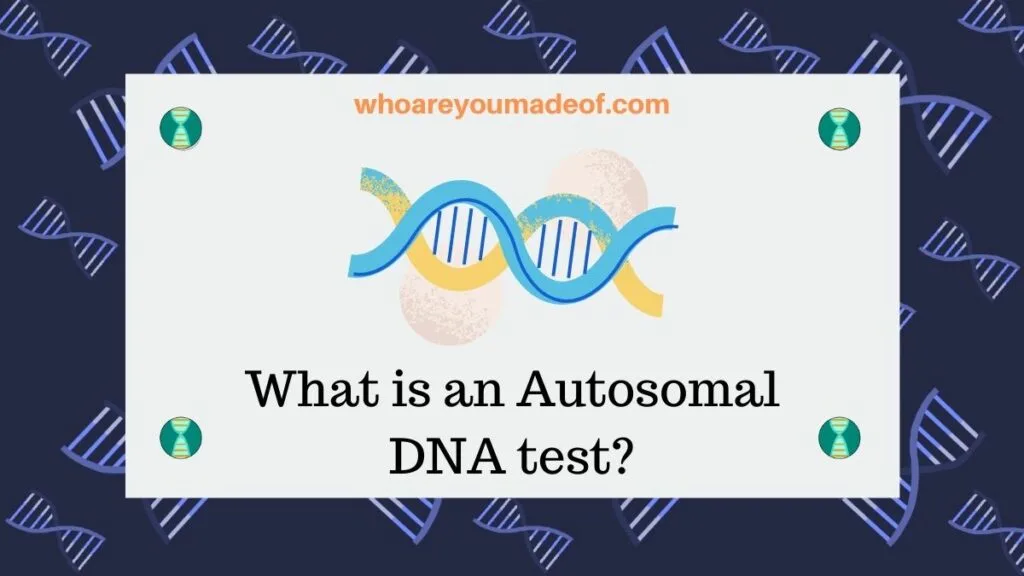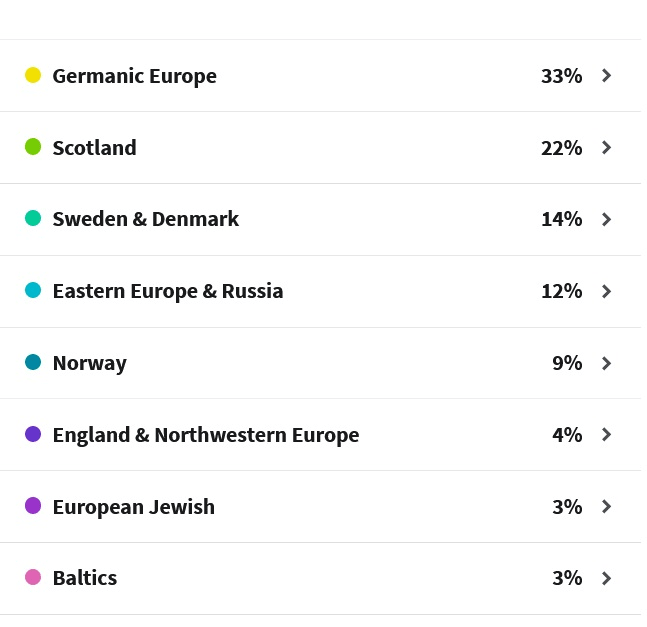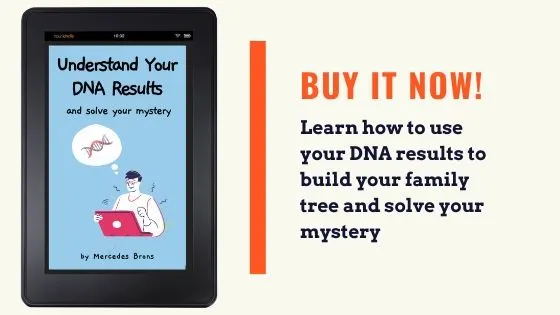What is an autosomal DNA test? Autosomal DNA testing has grown exponentially in popularity over the past several years, and in this post, you will learn everything you need to understand about this type of DNA testing.
There are several types of DNA tests that are available for purchase to the average consumer. These tests include Y-DNA testing and mitochondrial DNA (mtDNA) tests.

However, autosomal DNA tests are the most popular, by far. In addition, they are generally the most useful, affordable, and fun DNA tests on the market.
Autosomal DNA tests analyze autosomal DNA that is found in our 23 chromosomes, unlike other genetic tests that test Y-DNA or mtDNA. Additionally, autosomal DNA tests can generally be completed for under $100, and the results are easy to understand and use for many purposes.
What does an autosomal DNA test show?
Autosomal DNA tests can provide you with information about the ethnicity of your ancestors, which regions of the world they likely called home, as well as help you discover living relatives who have also tested their DNA. People can use their DNA results to find biological relatives and verify family tree research.
Autosomal DNA testing for ethnicity is the most popular element of DNA results. Ethnicity information is often included in the "ethnicity estimate" part of your DNA results.
Below is an example from a version of my DNA results to show what you could expect from Ancestry DNA results, just to illustrate what an ethnicity estimate looks like. Some results are reported in a list, like below, or in a pie chart.

My results have since gone through a minor update, so they look a little bit different today. That's the great part about these autosomal DNA tests.
As companies improve their data and methods, will update the DNA results of all of their customers at no charge.
My favorite aspect of DNA testing is the DNA matches. If you choose to participate in matching, all of the top companies will provide you with a list of people who share DNA with you, also called DNA matches.
By learning how you are related to your DNA matches, you can learn about more living relatives and discover unknown ancestors. I use DNA matches extensively for genealogy, and I find them very helpful.
Autosomal DNA test cost
The regular price of an autosomal DNA test from a reputable company is typically between $79-99, a one-time fee. No company requires an ongoing subscription to receive or continue to use DNA results.
The most reputable DNA testing companies, and the only ones that I recommend are:
- Ancestry DNA
- 23andMe
- Family Tree DNA
- MyHeritage DNA
Almost all of the most popular DNA testing companies offer their testing kits at a reduced price multiple times each year. For example, there are usually sales around the winter holidays, Valentine's Day, and Mother's Day, among other popular holidays.
During sale periods, you might be able to get the more inexpensive autosomal DNA tests for a price as low as $39. The more expensive tests usually go on sale for as low as $59-79.
How Does an Autosomal DNA Test Work?
There are two ways to collect your DNA for an autosomal test: saliva or a cheek swab. There are small amounts of DNA contained in our saliva, and genetic testing companies are able to extract this DNA for analysis.
No blood sample required, phew!
We get a totally random combination of DNA from each of our parents - 50% from each, to be specific. An autosomal DNA test examines more than 700,000 genetic markers, also described as autosomal DNA markers - from both sides of your family - to find overlap with other people who have taken the test or have their DNA in the database.
Using this information, the testing companies are able to provide you with DNA matches, information on your ethnic origins, and more.
Why Do People Take Autosomal DNA Tests?
People take autosomal DNA test for a variety of reasons. Some people take them just for fun to see where their ancestors may have lived, while others take the tests to help in their search for living family.
I am really passionate about these tests, so if I sound excited and pumped up about them, it's because learning about these tests and how to use the results have changed my life in so many ways. They are a truly amazing and powerful tool for learning about our living family and ancestors.
People can use these tests to:
- Find their biological parents, if they are adopted or have an unknown parent
- Locate relatives, ranging from siblings to 8th cousins
- Find out where their ancestors came from through their ethnicity estimates
- Build their family tree
- Break through brick walls on their family tree
- Uncover family secrets
- Solve family myths or mysteries
There are even more reasons to take the test, and more things that you can do with the results. My hope is that your curiosity is awakened by the list of reasons and that you can think of your own reason for taking a test.
Can Women Take the Autosomal DNA Test?
Yes, both males and females inherit autosomal DNA from their ancestors. Therefore, both men and women can take an autosomal DNA test and receive results of the same quality and usefulness.
I'd like to take this moment to dispel a very common myth about genealogical DNA tests. Many people believe that DNA tests can't tell you anything about your maternal line of your family tree.
This is absolutely untrue! An autosomal DNA test is the best way to learn about the maternal AND paternal line.
There are some "older" DNA tests that only work for men, since women don't have a Y chromosome. In addition, there are other tests that can trace extremely ancient ancestry through your maternal (mtDNA) line, for example. These tests are interesting and can be useful for those who take a more academic interest in their ancestral origins.
For the rest of us, the autosomal DNA test is a perfect way to find new family members, research and verify our family trees, and investigate our ancestor's geographic origins.
What is the best autosomal DNA test?
In my opinion, having worked with DNA results for several years, the best autosomal DNA tests available today are offered by AncestryDNA and 23andMe. My Heritage DNA and Family Tree DNA also offer excellent tests, and sometimes offer theirs at lower prices.
If you are interested in taking an autosomal DNA test (very helpful for genealogy!), you can get your test from the following links for tests that I recommend. I have personal experience with the quality of the test results and feel confident recommending these companies:
You can order a DNA test using any of the links below. I may receive a very small commission that helps me support this site, and it is at no extra cost to you, so thank you!
All of the comapnies above offer a high-quality test. In addition, your DNA data can be downloaded into a raw DNA file from these companies to be uploaded to sites like Gedmatch.
Conclusion
I hope that this post has helped you learn everything that you wanted to know about what autosomal DNA testing is, how it works, and all that you can learn from your test results. As always, if you have any questions about something that you read in this post, please ask me below and I will see if I can help.
Are you planning on taking a DNA test or are you still unsure? I'd like to hear from you in the comments.
Thanks for stopping by!


Virginia l smith
Monday 24th of July 2023
Is outside of Missouri that I,m related to anyone in muisc& movies.have to give a text.my name is miss.virginia.l.smith.
Elizabeth Wright
Monday 26th of June 2023
I did a DNA test on MyHeritage. Can I add the DNA onto other websites?
Dawn Brown
Saturday 23rd of July 2022
I need to find out if my father is my biological, paternal father. I was never told that he wasn't until recently by my sister. I need to put an END to this argument. Thank you for your help.
Mercedes
Sunday 24th of July 2022
Hi Dawn, If two sisters take a DNA test (any test, such as the one offered by Ancestry, 23andMe, or Family Tree DNA) they will be able to compare their DNA to see how much DNA they share. Two full sisters who share the same father and mother will share at least 2300 centimorgans of DNA and have a full match on the X-chromosome. I hope this helps! Sincerely, Mercedes
EDWARD NISBET
Friday 1st of April 2022
I am Ed Nisbet, the secretary of the Nesbitt/Nisbet Genealogy Society (www,ibydeit.org). We have a major Nesbitt/Nisbet project with FamilyTreeeDNA to help our members with their genealogy research. We are planning a autosomal DNA presentation for our Society and Facebook members. Most have knowledge of Y-DNA but not Autosomal DNA. I would like to use your "What is an Autosomal DNA Test? picture in our promotion of the presentation. Please let me know as soon as possible. Thank you, Ed Nisbet
Susan Howes
Sunday 27th of June 2021
I'd like to know if it's possible that if a woman does the autosomal test, will her paternal line be included in the results?
Thank you